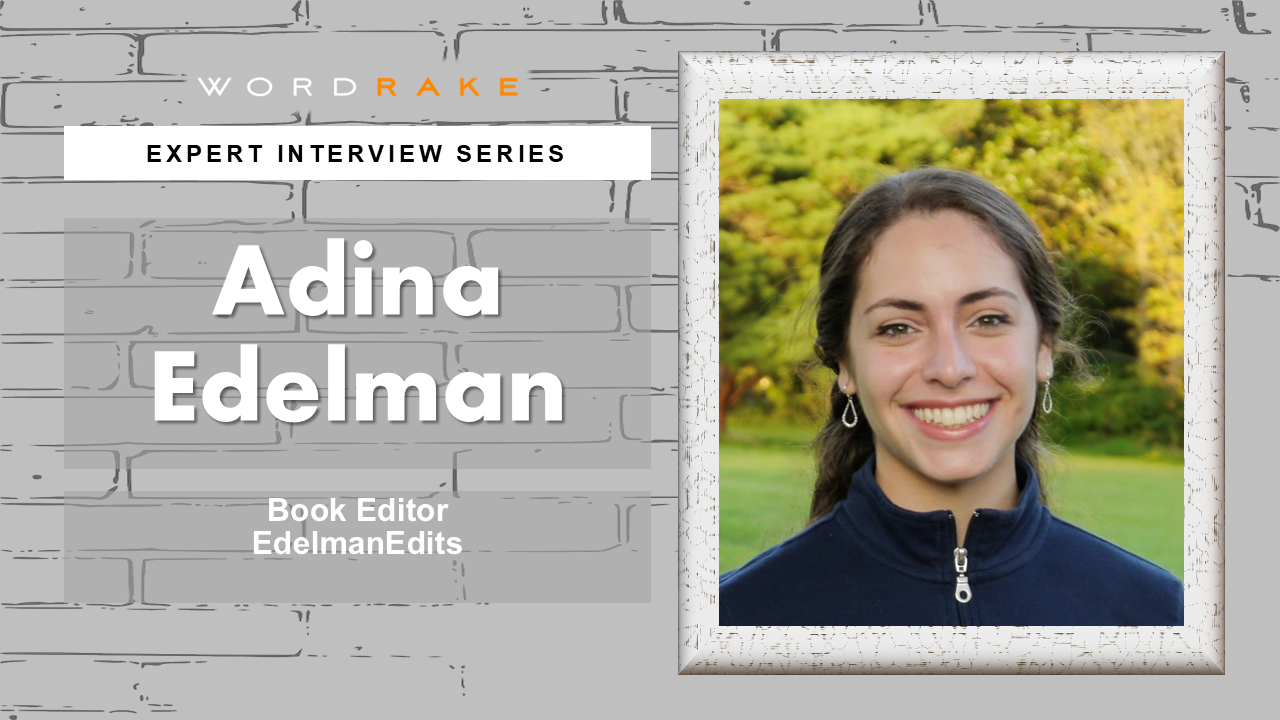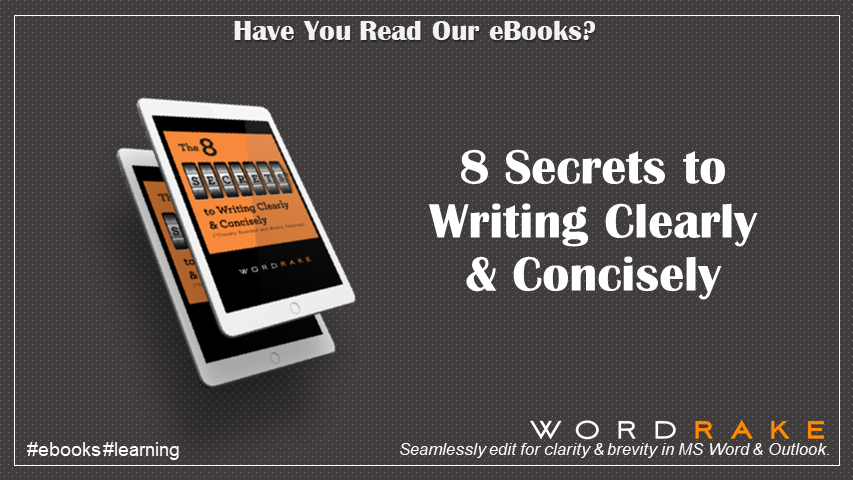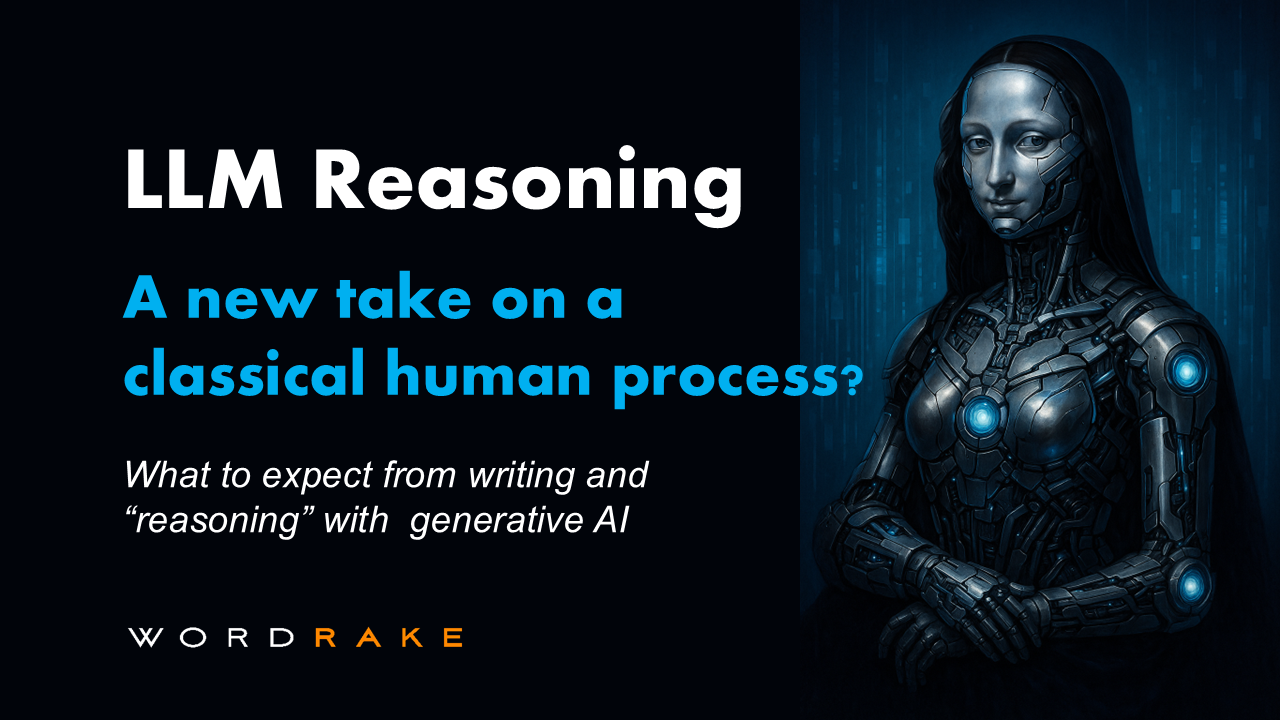At WordRake we work with a lot of legal, government, and non-fiction writers, but fiction writing needs love too! That's why we reached out to fiction editor Adina Edelman to find out a bit more about her craft.
What is your role and how are you involved in editing?
I am a book editor for publishers and indie authors. I’ve been doing this for over five years and have worked on over 130 books. I work primarily on memoir and fiction and offer developmental editing through proofreading, as well as manuscript evaluations.
I also offer what I call Brainstorm Bursts, which are 30-minute sessions of discussing your writing block, be it POV issues, character development problems, or other craft conundrums. After half an hour, you walk away with a path forward. It’s great fun.
What prompted your interest in editing?
I love books. I’ve always been a reader, I’ve written for years (recently published my own book, actually), and when it was time to think about careers, I knew I wanted to be in the publishing space. I landed on editing because I’m passionate about helping authors improve their stories. My tagline, “Mining Your Message for Gold” came about after I started editing and saw how certain vanity publishers will just slap a proofread on a book that needs a higher level of service. I feel strongly that editing should be about your message, your story, and unearthing all the gold it has to offer. It’s not about buffing up fool’s gold and selling that as the real thing.
What do you love about your job? What do you not love?
I love speaking with my authors. We have a 60-minute call after each round of editing to go over queries and address any concerns, and it’s always a blast every time. I also just love working on a meaningful or downright enjoyable project, be it a personal memoir or adventure novel. I have the tools to take the story to the next level, and it’s an honor to be a part of that.
As for what I don’t love, marketing is a big one. As an English major, I was not taught how to run a business, and I’ve had to learn that all on my own (with some help). On the editing side, it can be really difficult working with an author who either cannot or will not incorporate my edits. Meaning, they’re either incapable of revising or they refuse to change their work. That can be quite frustrating, but thankfully it doesn’t happen too often.
Who are some of your favorite writers? What about their work stands out to you?
I personally read a lot of middle-grade fiction. For one, it’s clean, which is important to me. For another, it’s just full of creativity and amazing writing. One of my favorite authors is Joan Bauer. She writes realistic fiction, but her characters are always these delightful, positive, lovable protagonists. Her writing style is also super engaging and enjoyable. There’s also K.A. Holt’s novels in verse. In general, I love novels in verse for their beautiful language and how they tackle hard topics. Kwame Alexander, Ellen Hopkins, Sharon Creech, and Heather Smith are other great authors of verse. I’m also a big fantasy and sci-fi fan. Brandon Sanderson’s worldbuilding is astounding, Jonathan Stroud has wonderful plotting and characters, and yes, of course, JK Rowling. Powerhouses.
What is the most interesting piece of writing you’ve ever been asked to work on?
One of the top ones that come to mind is Jason France’s memoir, Five Million Steps. It’s about his journey hiking the Pacific Crest Trail after serving in the air force for thirty-one years. It’s an amazing book, and his stories and the lessons he gained from his experiences are powerful. These are the kinds of books I feel so privileged to work on because I don’t only benefit from them as an editor—I benefit from them as a reader as well.
What makes you reject a prospective editing or proofreading job?
Two things:
- Interest. I simply have to be interested in it, or the editing process will be much more difficult. This is why I’ve stopped working (generally speaking) on nonfiction outside of memoir. I used to do self-help and business books, but I’ve simply lost interest for them. My mind is in story. That’s where I edit best.
- Values. I don’t work on any stories with romance, a lot of cursing, or heavy Christian content. It’s just not for me, and I happily pass those kinds of projects on to another editor in my network.
Is there a difference between editing fiction and nonfiction? Do editors specialize in certain genres?
There is a difference, yes, especially on a big-picture level. There are separate things to look for in fiction that you wouldn’t have to deal with in, say, a business book. For example, plot elements and character arc. Do some of those things translate into nonfiction? Yes, and there are nonfiction coaches and editors who take that approach by naming the reader the “hero” and outlining the “journey” they undertake through reading the nonfiction book. But generally speaking, the things an editor has to edit in fiction will be quite different than in nonfiction.
And yes, many editors will specialize in particular genres, whether it’s simply fiction vs. nonfiction or particular fiction genres as opposed to others. They’ll build up the skillset that is required for the genre they want to focus on. Editing graphic novels requires different knowledge than editing cookbooks. So too with editing sci-fi vs. literary fiction. They each come with their own list of things to look for, and editors usually gravitate to what interests them most or what they already have prior experience in and build on that.
Are editors able to edit their own writing?
When it comes to your own writing, you’re going to be subjective. Do editors perhaps have more skills with which to edit their own writing? Do we know more of what to look for and be aware of? Absolutely. But at the end of the day, we’re still subjective about our own writing. On a big-picture level, we’ll overlook plot holes that will be obvious to others. On a sentence level, we won’t notice that missing word, because our brains know what we meant to say and will automatically fill it in for us. So yes, every editor should have an editor for their own writing. That impartial view is crucial for making the work the best it can be.
Why do writers and editors talk about “killing your darlings?” What does it mean, and why should you do it?
This goes back to the idea about subjectivity. Writers tend to be very close to their work; I’m an author, I should know. We pour a lot of ourselves into our writing, and I think we’re all familiar with the feeling of writing a sentence that we think is just fabulous. Until someone tells us they don’t get it. “Can you revise this so it’s clearer?” And we just stare at them because how can they not understand the genius?
And therein lies the problem. Sometimes we have trouble letting go of what serves us when what we should be doing is serving the reader. Our “darlings” may be darling to us, but they won’t always be darling to our readers. Those phrases we love may actually be purple prose, which tends to obscure any meaning. That scene we think is hysterical might give the completely wrong tone for the story. And that ending that seems so awesome might actually alienate readers and decrease sales. And so they need to be “killed.” Again, it’s about serving the reader, not the writer.
Are you worried that AI will take over for human writers and editors? Why or why not?
Short answer: Nope.
I believe that writers who truly love their craft and understand why we write—for expression, for creativity, for the sheer joy of it—will never stop writing. They might understand the purpose of AI (a tool) and use it as an aid, but they’ll never let AI “take over” their writing because that’s like a painter asking someone else to paint something for them. Why ask someone to do what you want to do yourself? Ah, yes, there are many people out there who either don’t enjoy it or see the purpose in it, but those aren’t the people writing powerful, moving books, engaging novels, or thought-provoking articles. They aren’t the ones who, I feel, really understand what writing is all about.
As for editors, could AI eventually take over proofreading or even copyediting? Maybe. Still not sure on that. So much of editing relies on human understanding and the ability to discern and evaluate on an emotional level. You can’t teach a machine to do that. I certainly don’t think it could take over line editors or developmental editors. Could it be a tool? Sure. I think that should be the goal of every technological creation: to help humans. Will it completely replace good writers and editors? I’m not worried about that.
If someone is already a good writer, why would they need an editor?
If someone is already a good singer, why would they need a vocal coach? Because the singer is not (yet) professionally trained. She doesn’t know what she’s doing wrong or what she could do better. More than that, singing in front of friends and family is completely different from singing in front of a crowded auditorium of a thousand. And even when she is professionally trained, there are new songs out there to master, new techniques to learn, and what better way to learn them than with someone whose actual job is to help her get there?
Same thing with a writer. Why does a good writer need an editor? Because the best way for a good writer to become a great writer is by taking in the feedback of a professional who can point out what’s not working and what can be made better.
At what point in the writing process should someone reach out to an editor?
There will come a time when you finish the first draft of your manuscript. Yay! It’s super exciting. You put it aside for a few months so you can gain some objectivity, and then you go through it to revise and make it the best it can be. During those few months, while you’re waiting, start “shopping” around for editors. Find out who works with your genre. Have some short coffee chats. Get a feel for their personality, process, and availability. Usually they’ll ask to do a sample edit on your work to make sure it’s a good fit. You should do this after you have revised the book. You want to do as much as you can on your own before handing it over to a professional. The cleaner you can get it on your own, the more you get out of the edit since your editor will be able to catch the things you couldn’t find yourself.
How do you find the right editor to work on your project?
First, ask around. Can any of your writer friends recommend an editor they’ve worked with? It’s a good idea to find an editor who works with your genre, is highly interested in your book, and understands what you’re trying to do with it. It’s pretty easy, actually, to find names of editors. Go on LinkedIn, check the EFA’s database, do a Google search—anything. The harder part is narrowing it down. But again, check for genre, then go through testimonials, and then ask for a chat if things look okay.
Once you have, say, three or four editors narrowed down, then ask for sample edits. This is what will ultimately lead you to your choice of editor. The sample edit is the first step of my process: five pages line edited, and up to thirty pages reviewed with comments. It enables the writer to see my editing style on their work. It also lets me see if it’s something I’d take on and, if so, what editing level it needs, how much that would cost, and how long it would take. I charge $150 because of the value it provides (and then discount the price from the book edit if we move forward), but many charge lower or nothing for their samples.
What should you do if you can’t afford a professional editor?
This is a tough question because it’s a very real problem that so many have. Book edits are not cheap. They’re really not. And if you’ve written a 120k-word fantasy novel, that means upwards of $8,000 for a full book edit, not counting design or marketing. Oof.
One thing I want to say: If you can, save up. People save up for vacations and their dream car. If it’s important to you, save up for a book edit.
Beyond that, self-editing can save you literally thousands of dollars in professional book editing. Knowing how to properly self-edit your book is not the same thing as a professional edit, but wow it makes a huge difference. There are $20 books that help with this, like Richard Bradburn’s Self-Editing for Self-Publishers. There are less expensive courses for this, like Jeanette Smith’s “Everyone Should Edit” course.
I would not say to rely on Grammarly or other AI checkers. Can they be helpful? Absolutely. But they can also persuade you to make style and grammatical changes that are either unnecessary or incorrect. So use them, but use them with discretion.
Finally, there is the option of manuscript evaluations, which are kind of like a DIY developmental edit and a third of the price. For a 50k novel, I’d charge about $900 for an eval. It’s a 10- to 20-page assessment of the strengths and weaknesses of your book, and if you know how to self-edit, you can take that feedback and greatly improve your book.
So there are options!
About Adina Edelman
Adina is a book editor based in Baltimore, MD. She works with indie authors and publishing companies, digging deep to unearth the gold in their stories. Adina has worked on over 130 books of various genres and now specializes in fiction and memoir. She recently published her own novel, Breaking Open, with Israel Bookshop Publications.
You can find out more about her editing services at edelmanedits.com and connect with her on LinkedIn.









